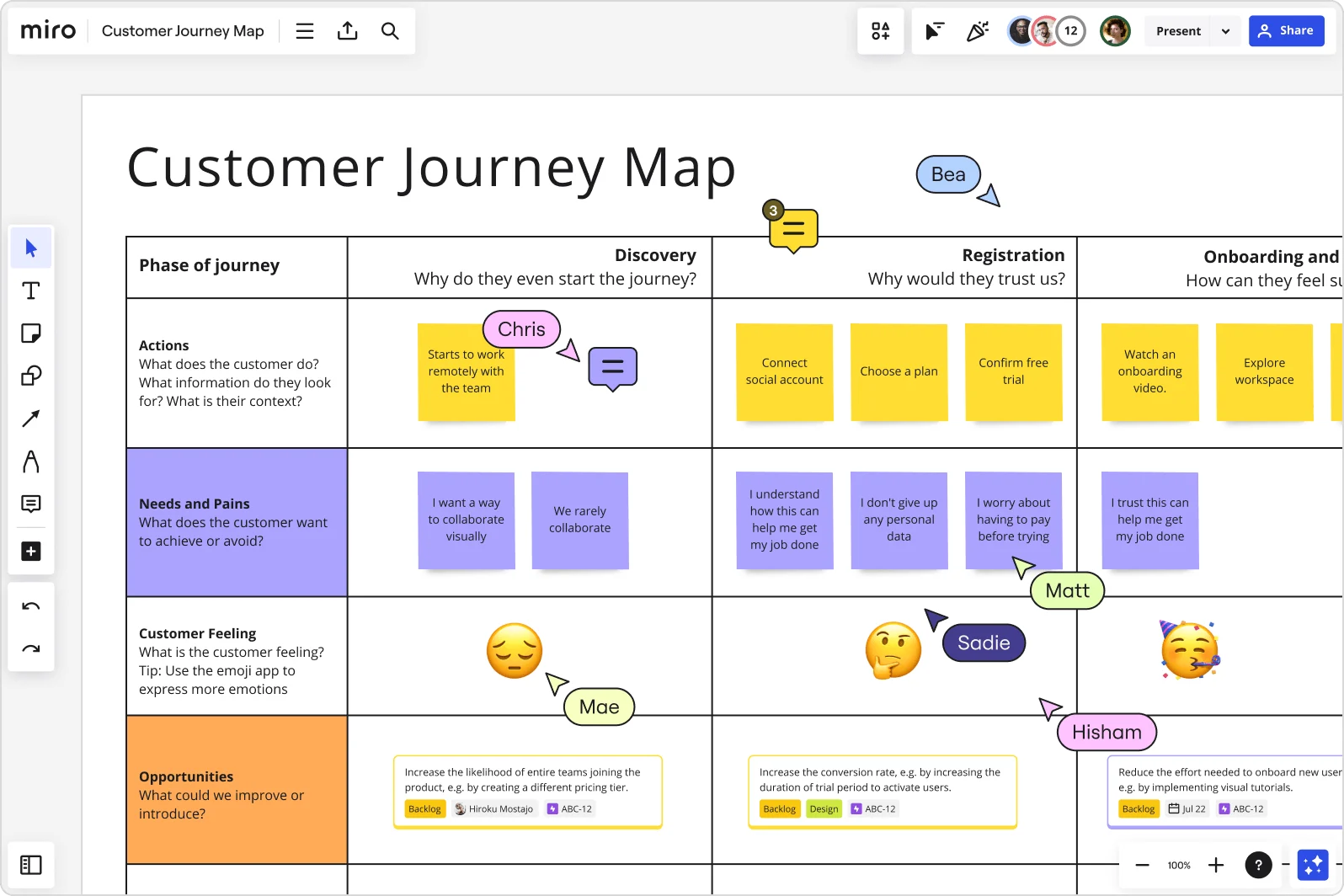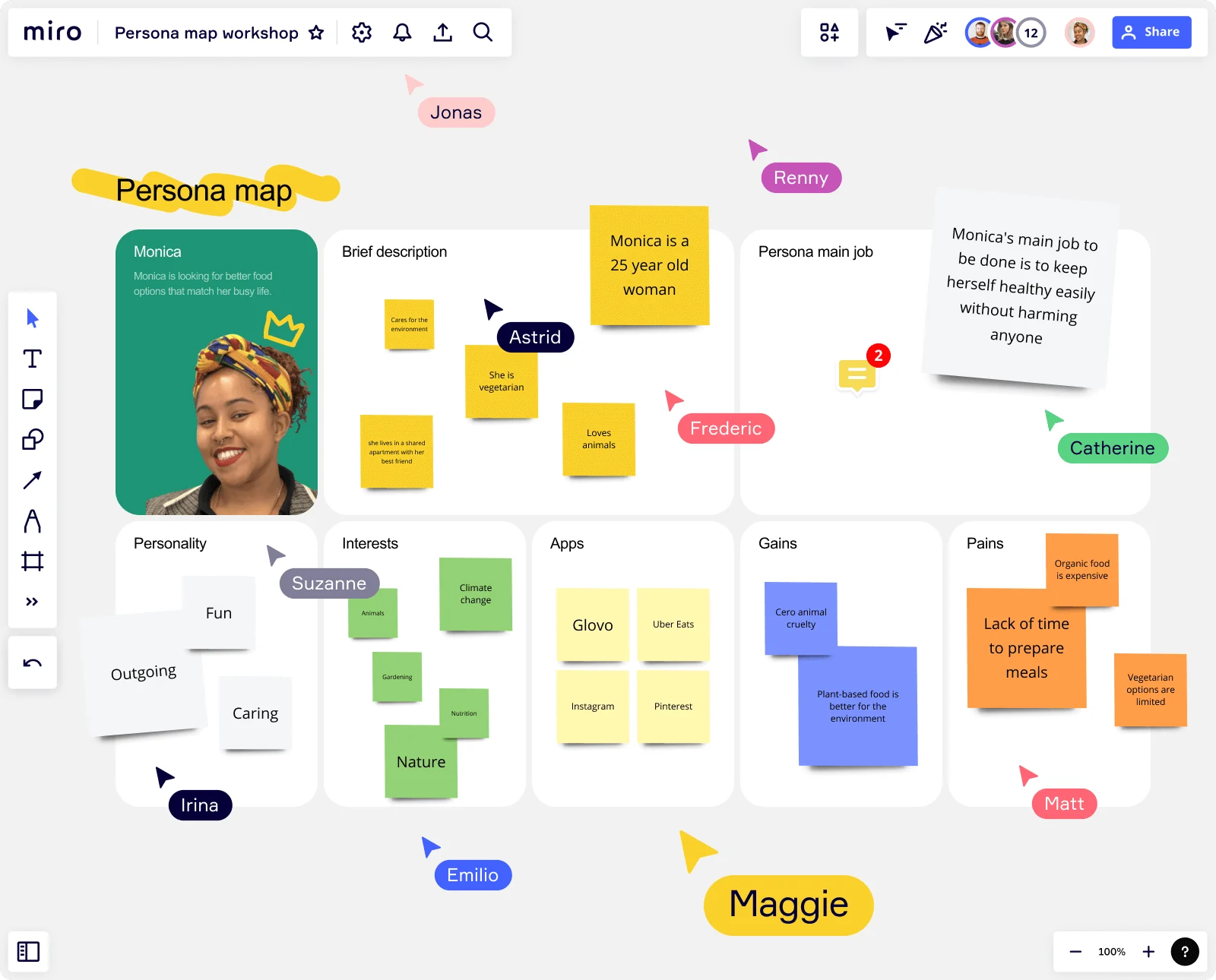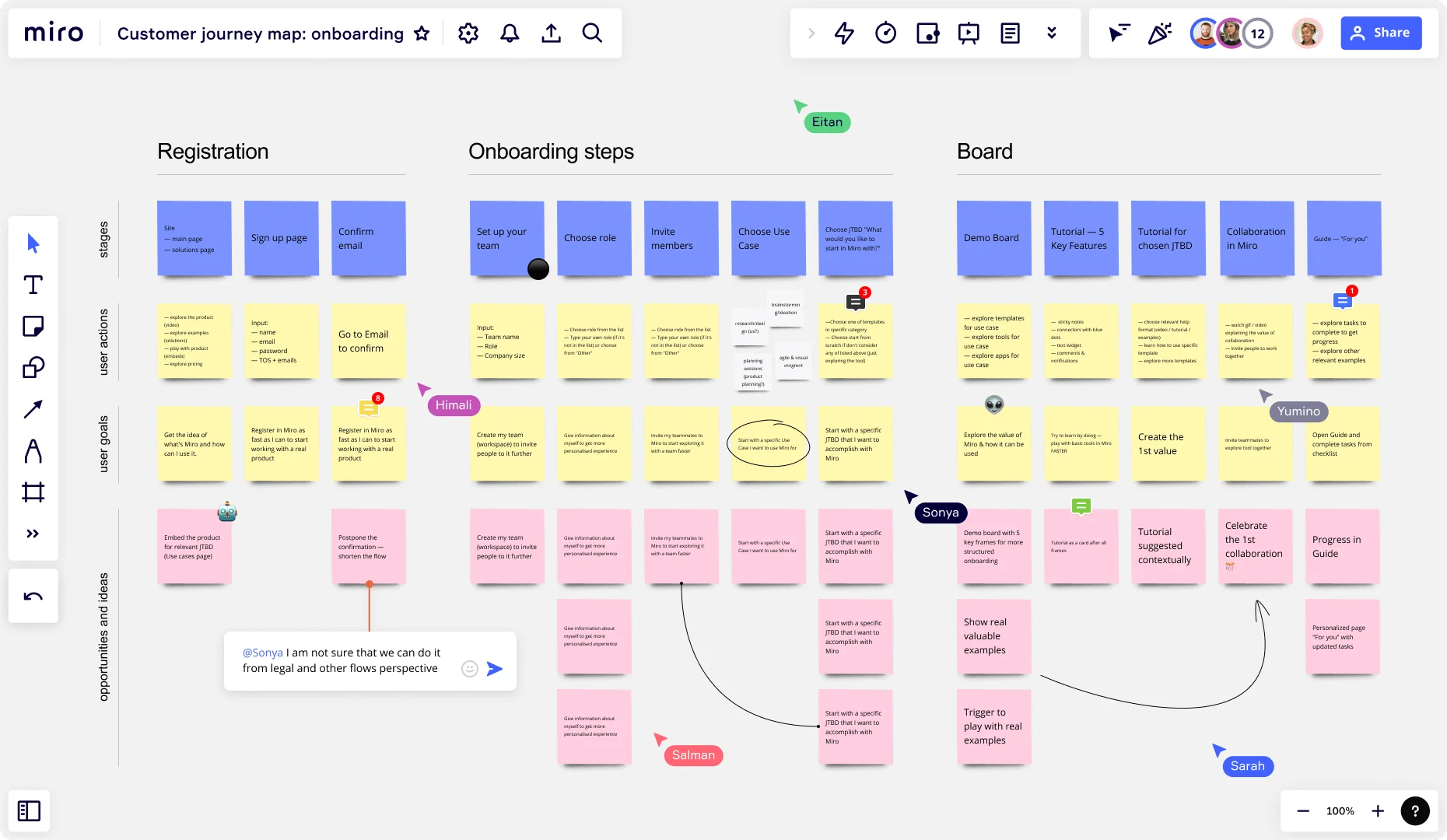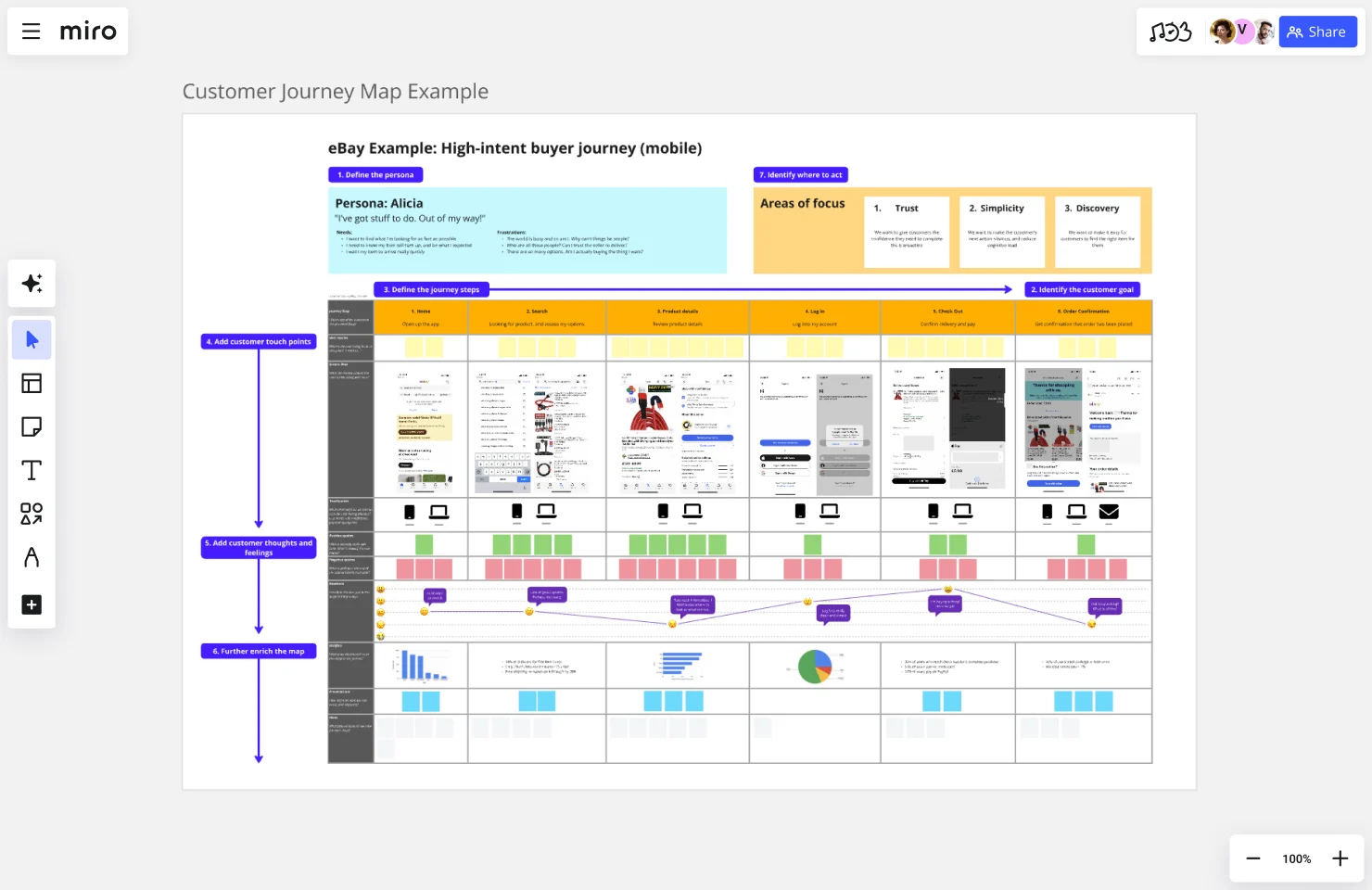
Table of contents
Table of contents
Customer journey map explained: Everything you need to know

Definition of customer journey mapping
A customer journey map (or CJM) is a visual representation of the process your customers go through when interacting with your company. This diagram takes you through the exact steps that lead to a customer choosing your specific product and buying it from your business. Creating a customer journey map will provide you with a visual storyline of how a buyer or a customer persona engages with your business at every touchpoint. From seeing your brand on social media to going into the store to buy the product — the customer journey will document the entire story.
Try Miro now
Enhance customer experiences with Miro's Journey Mapping tools for clear visualization.
Customer journey maps are especially useful when they chart the experience of a single persona. By taking one specific customer persona, such as a small business owner or a single mother, the journey map can be detailed and specific — providing you with data and information about how to target specific customers. If you include too many personas on one customer journey map, you risk your diagram becoming too generic, and you may overlook new opportunities. You’ll likely need multiple customer journey maps to accurately depict the many personas of your target audience. But of course, you’ll need to define those personas first. Miro has a user persona template that can help you represent your target audience and better understand how to satisfy their needs with your product.

Why is customer journey mapping important?
Ever wondered what makes a customer buy a specific product from a certain company? The answer often lies in the journey the customer takes above all else. Here’s why mapping the customer journey is so important for every business, no matter how big or small.
Makes complex customer journeys easy to understand
Like other diagrams and concept maps, turning a complex process like a customer journey into a visual representation brings clarity and shared understanding. Instead of trying to describe a customer journey model exclusively with words, the diagram gives everyone on your team a visual overview of the entire customer experience.
Most customer journey touchpoints are mapped on a timeline, which creates a chronological understanding of the needs and wants of the customer at each stage of the process. Having a tool that makes it easier for your team to understand these complex journeys is crucial, as often, a customer journey doesn’t align with one specific department. For example, marketing, sales, customer service, and technical support may all need to be involved in creating an ideal user experience.
Everyone from each of these departments needs to be clear on how the journey works, where the handoffs are, and how to maximize the experience. By having one diagram act as a point of reference, different departments can ensure they are on the same page and can make informed, collaborative decisions.
Puts you in the customer’s shoes
An effective customer journey map helps you learn not only customer behavior but also how customers interact with your product. It also helps you understand your customers on an emotional level, acknowledging what causes them frustration, happiness, and excitement. By putting yourself in a customer’s shoes, you can follow their entire journey from brand awareness to advocacy. This allows you to gain deeper insights into the customer’s pain points and what compelled them to choose your company’s product. Based on this analysis, you can tailor your business processes to attract similar personas and increase conversions.
Creates a clearer understanding of your customer’s expectations
Customer journey mapping is a strategic approach that allows your company to understand customer expectations as well as what attracts certain personas to buy your product. By taking the time to understand the customer’s journey, you can understand what they expect from their experience with your business and product. This deeper understanding of what they need from your business allows you to proactively support them. It may also identify opportunities for upselling and cross-selling.
Contributes to long-term customer retention
Striving to understand what the customer needs and following their journey will allow you to optimize their experience with your company. This will make your customer feel heard and appreciated, and, as a result, brand loyalty among your customer base will increase. In turn, this will lead to high customer retention and, hopefully, an increase in purchase frequency, which will benefit your company greatly in the long term.
The benefits of customer journey mapping
Many great tools can help you understand the customer journey. Why should you care about this one? Here are a few reasons why CJMs should be an essential part of your business toolkit.
Build better experiences
Customer journey mapping gives you a big-picture experience of your customer’s interaction with your brand. Think of a CJM as a map of a physical location like a city or a town. Once you have a map spread out in front of you, it’s easier to understand where you might run into roadblocks. It helps you plan ahead, and make adjustments to help customers overcome those obstacles.
Once you can visualize all phases of your customer’s journey, you can see where you’re not meeting their expectations. Armed with that knowledge, you can build a customer experience that’s seamless and satisfying. That translates into improved products and processes, more sales, faster sales cycles, and greater customer retention.
Enable customer success
For your business to succeed, your customer must also succeed. Customer journey mapping helps you see what is and isn’t working for your customer so you can set them up for success. Even a stylized picture of your customer’s journey can empower you to create, monitor, adjust, and enhance touch points.
Work better as a team
Even if your objectives are different, everyone in your organization is working toward the same goal: satisfying your customers. But it’s easy to lose focus. Engineering teams are busy coding, marketing teams are writing ad copy, sales teams are trying to sell to their prospects.… How do you all stay aligned?
Customer journey mapping is powerful because it keeps everyone focused on the customer. By creating a CJM, you can gain deep insight into what your customers want and need. For the marketing team, that means building better campaigns. For the sales team, that means deeper engagement with customers and prospects. For engineering, that means a holistic understanding of what programs are meant to achieve. Customer journey mapping makes it easy to equip every team member with a sophisticated understanding of your customers.
Set yourself apart from the competition
A recent report shows that 90% of the organizations that use customer journey mapping saw a decrease in churn and customer complaints. Customers and prospects respond positively when they feel like a brand understands their desires and pain points. The data is clear: customer journey mapping can set you apart from your competition.
5 customer journey stages
The customer journey map can be split into five important stages, as seen in this customer journey mapping template pack. Each customer will go through these stages as they interact with your company during their journey.
1. Awareness
Awareness is the moment when a buyer first becomes aware of your company, product, or brand. This can happen through a variety of mediums, from social media advertising to a word-of-mouth referral from another customer. Your brand can increase awareness and attract more customers through marketing practices and brand advertising. Paying attention to how your target audience grows their awareness of your brand enables you to optimize your marketing approach, budget, and channel prioritization.
2. Consideration
After your customer has become aware of your brand, they move into the consideration stage. This is a stage of ideation in which the customer considers whether they need the product or service your business is offering. They may also consider other companies that offer the same product. This stage proves the importance of good advertising at the awareness stage. If your company markets itself well, the customer will likely consider your product even more closely at this stage.
3. Purchase/Decision
After the customer has considered all of their options, it’s time to decide on the product or service they are going to purchase — or whether they’re going to make a purchase at all. Should they decide against buying, that will be the end of their personal customer journey. If that is the case, your company should focus on improving the awareness and consideration stages by working on its customer service or trying out new advertising or personalized promotional techniques.
4. Retention
Remember: the customer journey doesn’t end once they’ve made a purchase. Every company wants a loyal base of customers who return time and time again, which is why your team should analyze what needs to be done to stop customers from leaving. Fostering brand loyalty is a great way to improve your business’s general income. You can aim to retain customers by providing things like incentives, better customer support, and reminders about new products through digital marketing.
5. Advocacy
The last stage in the customer journey is advocacy — letting other people know about your brand or the service that you offer. Customers are more likely to advocate for your company if they are completely satisfied throughout each stage of the customer journey. This shows the interconnectedness of every step and how the journey is a circular pattern, even if it focuses on different personas.
What are customer journey touchpoints?

Throughout the five customer journey stages, there are different customer touchpoints. These are the moments in the customer journey when the customer interacts or engages with the business. Let’s take a closer look at the three types of touchpoints.
1. Pre-purchase touchpoints
A pre-purchase touchpoint includes any time when the customer interacts with your business before making a purchase decision. Pre-purchase touchpoints can occur in the awareness and consideration stages. They can also happen when another customer that has already gone through the entire customer journey refers your business. Pre-purchase touchpoints can happen if a buyer comes into contact with your business by visiting your website, seeing a post about you on social media, or hearing about your product from a friend. This point of the customer journey is all about persuasion and explanation. You need to make sure that when the customer discovers your business for the first time, you demonstrate that you can fulfill their buying needs.
2. Purchase touchpoints
Purchase touchpoints take place during the decision/purchasing stage of the buyer’s journey. This can happen in-store or online. You should optimize this stage to be as efficient and streamlined as possible so that the customer doesn’t change their mind during the purchase. For example, having a slow website that isn’t mobile optimized or forcing the customer to jump through hoops with a sales assistant to make a purchase will affect the buying process. Optimizing this touchpoint is essential to retaining customers, as a quick and easy purchase process could compel them to return in the future.
3. Post-purchase touchpoints
Post-purchase touchpoints include the journey’s advocacy and retention phases. The success of these touchpoints depends on how well-optimized the previous stages in the journey were. If the entire journey up until this point was enjoyable for the customer, they are more likely to refer your product or service to their friends and family. You should try to stay in regular contact with the customer to remind them about the journey and your company, as this will encourage them to return in the future.

What’s the difference between a customer journey map and a user story map?
Although customer journey maps and user story maps resemble each other, their functions are slightly different.
User stories are used to plan out features or functionalities, typically in an Agile model. In a user story, you describe a feature or functionality from user perspectives. That way, you can understand what the user wants to do and how that feature can help them accomplish it. Use a customer problem statement template to help you craft these perspectives.

Typically, a user story takes this form: “As a [type of user], I want to [goal], so that [benefit].” For example, “As a UX designer, I want to sketch on an online whiteboard, so I don’t have to be in the same location as my collaborators.”
You can then visualize that user story with a user story map. For example, if you wanted to visualize the user story above, you would start by detailing the various steps the user will take when using that functionality. In this case:
Sign up
Sketch on the whiteboard
Share with teammates
See teammates sketch in real time
Then, you would document the features required to take each step. Once you’ve done that, you would write these features on sticky notes and rearrange them based on their corresponding functionalities.
In short, user story maps allow you to plan and implement changes to the customer journey. Customer journey maps allow you to discover and understand what those changes might look like.
How to create a customer journey map
Creating a great customer journey map can be challenging. You need to get into the mind of a specific customer persona and understand not only their needs but also the different ways in which they interact with your company.
See how Maureen, Product Designer at Miro, deep dives into understanding users' experiences, working hand in hand with them to sketch out their journey. All within the platform. She'll share the details of how she and her team brainstorm ideas to tackle insights they uncover — and craft a practical plan to move forward.
With Miro’s customer journey mapping tool, you can streamline the process of creating one of these maps for your specific needs. Or, if you'd rather not start from scratch, follow these steps when filling out Miro’s customer journey map templates:
1. Set clear objectives for the map
Before diving into the creation of your customer journey map, ask yourself why you need to know this information. Are you looking to optimize certain touchpoints? Are you looking to see why customer retention is low? Do you want to determine why customers decide against your product? Figuring out why you’re building the map is essential to the success of the exercise.
2. Identify profiles and personas
As previously mentioned, you need to focus on a specific persona when examining the customer journey. It’s important to remember that the customer journey map should focus on one specific audience at a time. This will help you figure out exactly who your target customer base is and gain an in-depth understanding of the buyer’s needs that your company is attempting to fulfill.
3. List the customer journey touchpoints
Next, you need to understand what happens each time the customer comes into contact with your company. These points in the process will tell you which areas of the journey you need to streamline and optimize to improve the customer experience.
4. Take the customer journey yourself
For the customer journey map exercise to be productive, you need to put yourself in the shoes of the customer and be honest with the experience that you have. This is the best way to see if your customer journey mapping is accurate and identify areas for improvement in the customer journey.
Customer journey mapping example
Here are some customer journey mapping examples for you to draw inspiration from and better understand what goes into a customer journey model.
Alex Gilev’s Practical Customer Journey Map
Alex Gilev is a certified UX expert and product leader experienced in creating highly usable and intuitive web applications. His practical customer journey map example created in Miro is based on the idea that you want to create an irreplaceable product for your customers. This customer journey map is divided into four phases: Discovery, Onboarding, Scaffolding, and Endgame.

This take on a customer journey map allows you to figure out practical fixes that will increase your competitive advantage over other businesses in the same industry. It helps you identify the value metrics that make your product desirable to the specified persona so that they’ll want to use your product frequently and repeatedly.
Miro's Customer Journey Map Template
Using Miro's Customer Journey Map Template can significantly improve the way you build your CJM. Our template has a dynamic setup, enabling teams to visualize the customer journey in detail. This CJM template helps identify key touchpoints, understand customer emotions and behaviors at each stage, and pinpoint areas for improvement.

This approach to CJM ensures that your customers receive the support and solutions they require at every step of their journey.
CJM by Hustle Badger
This Customer Journey Map (CJM) by Hustle Badger provides a comprehensive visual overview of the connection between the company's touchpoints and the customer's personal experience. It assists in pinpointing areas for enhancing customer experience and in aligning different teams and stakeholders on user experiences.

This template is a good CJM example for those looking for a more holistic approach to customer journey mapping.
Build a customer journey map suited to your needs
As we’ve shown, creating a customer journey map with your team has many benefits. This exercise can help you create the ideal experience for anyone who may come into contact with your company. It could be invaluable to the future of your business and help you build a loyal customer base.
Are you ready to get started with customer journey mapping? Try the Customer Journey Map Template, the ideal foundation on which to begin. This template is tailored to help your company identify touchpoints so that you can meet your customers’ needs.
Author: Miro Team
Last update: August 6, 2025